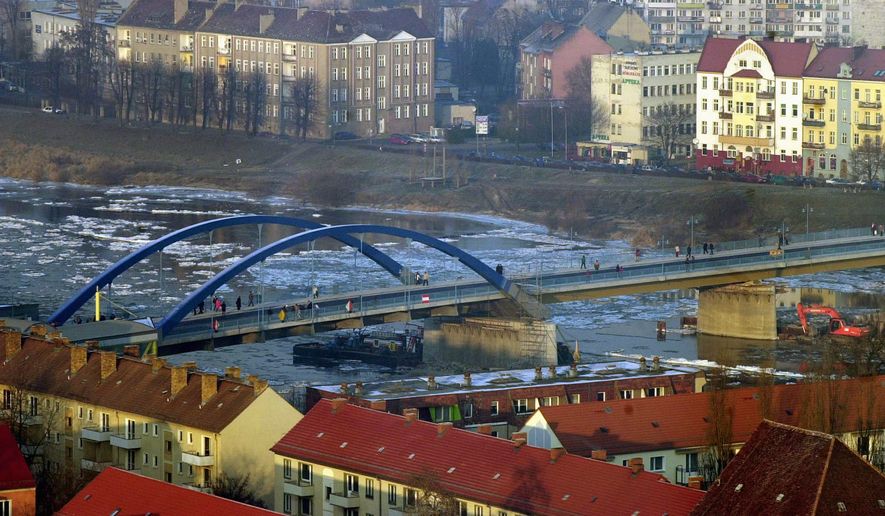SLUBICE, Poland — A bridge across the Oder River connects Frankfurt an der Oder in Germany and Slubice in Poland, but the differences between these sister cities are clearly visible.
On the German side, buildings are renovated; in Slubice, paint peels on storefronts that have not been freshened in decades.
It’s in towns like these, far from wealthy metropolises like Warsaw and Krakow, where residents complain about being left out of Poland’s post-communist economic success. These voters propelled Poland’s right wing into office this fall.
But now, the Law and Justice party, which won an absolute majority in parliamentary elections in October five months after having won the presidency, is coming under fire for behaving like dictators.
Critics say that under party boss and former Prime Minister Jaroslaw Kaczynski, Law and Justice has turned the government into a patronage mill, shuttered theatrical productions deemed pornographic, floated tighter control of the state-run media, reneged on Poland’s promise to accept Middle Eastern refugees streaming into Europe and pursued populist, Catholic-inspired social policies, such as opposition to same-sex marriage and abortion.
“They want to restore the glory of Poland and want to preserve this innate Polishness, including the Polish culture and religion, and use any means possible to do that,” said Christopher Hartwell, president of the Center for Social and Economic Research in Warsaw.
The policies are the heavy-handed reverse of the previous pro-European government of the Civic Platform party. The current president of the European Union, Donald Tusk, is a former Civic Platform prime minister.
In the latest of a series of controversial moves, Polish troops early Thursday stormed the NATO Counterintelligence Center of Excellence in Warsaw and replaced its director. (Though accredited by NATO, the center technically is not an alliance installation.)
Last month Prime Minister Beata Szydlo proposed packing the Constitutional Court to prevent justices appointed by the previous Civic Platform government from blocking Law and Justice’s legislative program.
That led to massive demonstrations by pro- and anti-government activists in the capital in an ongoing crisis. Ms. Szydlo has not recognized a court ruling that said three judges appointed by the previous government should remain in their positions.
Ms. Szydlo also appointed Mariusz Kaminski as security services minister even though he was convicted of corruption when he was in charge of Poland’s anti-corruption agency. He was appealing his three-year suspended sentence when President Andrzej Duda pardoned him earlier this year.
The prime minister also has removed European Union flags from her official appearances, opting instead solely for Poland’s white-and-red banner.
’Mugged by reality’
Law and Justice leaders claim they represent rural and working-class voters left behind by previous policies that benefited cosmopolitan elites. They’re protecting Poland’s sovereignty, they say, as bureaucrats in Brussels as well as former Polish communists, foreign bankers and corporations impose rules and force them to welcome potential terrorists from Syria.
Their critique isn’t unique in Europe.
Hungarian Prime Minister Viktor Orban, saying he admires the centralized governments of China and Russia, has used his parliamentary majorities to rewrite the country’s constitution to strengthen his powers and enfeeble the opposition.
In France, the xenophobic, right-wing National Front has surged in popularity recently, though it failed to secure a major victory in recent regional elections.
Germany’s PEGIDA movement has brought tens of thousands of people to the streets to sound alarms over Europe welcoming Muslim immigrants, while the country’s right-wing Alternative for Deutschland party is surging in the polls.
Still, the controversies triggered by Poland’s new leaders have eroded their support. A recent poll by the TNS marketing firm found that Law and Justice enjoyed the support of 27 percent of the people. In October the party won 38 percent of the vote, enough to form a government without coalition partners.
They could lose more support if they enact many of their plans, Mr. Hartwell said. The party has promised to lower the retirement age, which would boost pension costs to unsustainable levels, as well as increase social welfare spending, including subsidies for low-income households with children, he said.
“The government has had problems with spending for years now,” he said. “At a time when they should be tightening their belts and cutting down the size of government, we have Law and Justice coming in and promising goodies that Poland doesn’t have the money to pay for. I don’t know where they’re going to do it. It’s going to blow a huge hole in the budget.”
The government plans to raise money by raising taxes on foreign banks and supermarkets and strengthening collections of valued-added taxes, said Mr. Hartwell. But he believes those measures would likely hurt the country’s investment climate, potentially increase food prices and fail to generate sufficient revenues to cover stepped-up spending.
“My worry is they are social conservatives and fiscal liberals, and that leads to economic ruin,” said Mr. Hartwell. “Once they start trying to govern rather than just issuing decrees, they’re really going to be mugged by reality.”
Still, some voters say it’s all about frustration, but that they expect little to change.
“People voted for a right-wing government because they are frustrated economically and worried about immigration,” said Jakub, a voter from Poznan. “It’s easiest to blame people on the outside.”
“Political life changes all the time and brings no real changes,” he added. “This current government, just like all parties, will likely be in power for four to eight years, and then people will want something else when they see it doesn’t work.”




Please read our comment policy before commenting.